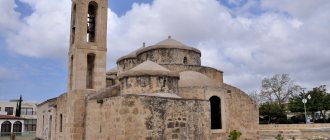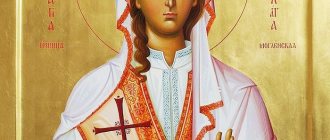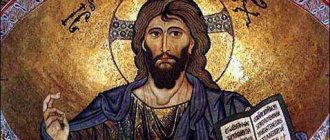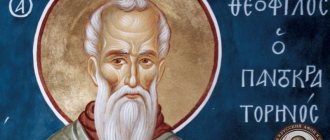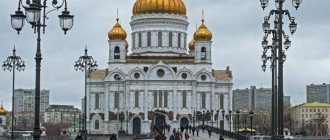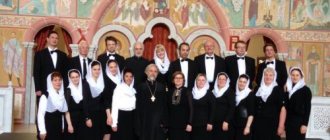Paraskeva Pyatnitsa - woman's intercessor
Martyr Paraskeva lived in the 3rd century in Asia Minor. The girl's father was a wealthy senator. Therefore, from childhood she lived in luxury and could not deny herself anything. However, Paraskeva chose to lead an ascetic lifestyle and devote herself to the Lord. She took a vow of celibacy.
Emperor Diocletian organized persecution aimed at supporters of Christian teaching. During them, Paraskeva was also arrested. She was tortured and forced to renounce her faith. Since the girl did not agree to do this, she was beheaded.
Among the Orthodox people, Saint Paraskeva Friday has always enjoyed special love. In ancient times, temples were built in her honor, which were called Fridays. Also, small chapels located near the road received this name in Rus'.
Among the people, icons of Saint Paraskeva were revered and decorated. In the old days they could be found in every home. Our ancestors believed that the saint protected family happiness. They also pray to the martyr for the preservation of the health of pets and for healing from mental and physical ailments.
Life of a saint
This fragile girl converted an entire city to Christ. This happened a long time ago, at the end of the 3rd century. In the famous Iconium, where the Apostle Paul himself once preached, there lived a girl named Paraskeva, which translated from Greek means Friday. Why Friday? On this day this saint was born . The parents named their daughter this way in gratitude to God, because it is on Friday that the church remembers the suffering of our Lord Jesus Christ, which he endured for the salvation of mankind.
Young Paraskeva grew up to the joy of all people. The words of Holy Scripture especially sank into her soul: “As long as there is time, let us do good to everyone, and especially to those of our own faith.” So the girl tried as best she could to help orphans and the poor, her own and strangers.
Many pagans lived in Iconium and Paraskeva told them about Christ, trying to enlighten them with the light of faith, and before Paraskeva’s spiritual eyes the mysterious words “As long as there is time...” “What do they mean” arose again and again? - the girl thought. “Day after day passes and time peacefully takes its course, will it ever stop”?
But then the ill-fated morning came, when time seemed to really stop counting down. An imperial decree on the extermination of Christians was posted throughout the city. Each of them had to either sacrifice to the pagan gods or suffer cruel execution. All of Iconium seemed to be plunged into pitch darkness. People looked at each other warily, the fun died down, and anxiety reigned.
What not to do on this day
Actually, Paraskeva Pyatnitsa herself is considered the patroness of the hearth, women's labor, yarn and weaving. Accordingly, the prohibitions on this day relate mainly to these aspects of human activity.
You cannot wash the floors, wash in general and wash your hair in particular. This goes back precisely to the pagan goddess Mokosh, who was a little bit the patroness of the dead, a little bit connected with water.
It was impossible to spin, although you could sew.
It was impossible to laugh and rejoice. Nevertheless, the great martyr suffered a rather painful death.
Pregnant women were not allowed to lend money. It was believed that in this way they, along with the money, also gave away the fate of the baby. Although this was considered not only on major holidays, but also in principle.
Pagan beginning
Many people consider Paraskeva Friday to be a pagan goddess, but this is not so. In fact, they confuse the saint with the goddess Makosh, who, according to pagan legends, was the patroness of water and households. There are similarities with Lada, who was the goddess of family and fertility. That is why people consider Saint Paraskeva the patroness of agriculture and family.
In addition, people mistakenly confuse the memory of the martyr with the cult of the Week. In response to these erroneous opinions, the Holy Synod issued a ban on mixing the holy image with pagan goddesses. But folk traditions are strong, so people continue to consecrate vegetables and fruits on the day of her memory.
Read about popular beliefs and superstitions:
- About evil eyes, damage and conspiracies
- Orthodoxy and the red thread from Israel
- Curses and Orthodoxy
The image of the martyr is also reflected in the mythology of other nations:
- Tajiks have a myth about the image of “Lady Tuesday”, who patronizes family and agriculture, in particular cotton processing;
- among the Germans it is the goddess Frigg, who helped women in labor and babies;
- among the Greeks, these are the Moirai;
- Icelanders have norns, etc.
The popular image depicts Friday as a tall, powerful woman with large breasts and a long braid. This idea makes her similar to the images of mermaids, Slavic goddesses and Doles. But it is wrong.
Important! Saint Paraskeva has nothing in common with pagan goddesses and is a martyr who died for the name of Christ, so she deserves to be venerated like any saint.
Saint Paraskeva, named Friday
What could be done?
Girls could pray to Saint Paraskeva in order to get married faster, since the saint was revered as one of the patronesses of the family and home. It was also possible to demonstrate your success in weaving flax and making yarn. Especially for potential gentlemen, because such a rather complex job perfectly demonstrated the girl’s thriftiness.
It is recommended to visit church on almost any Orthodox holiday. And pray not only to the “thematic saint”, but also to other icons. After all, for a deeply religious person, time does not matter much and you can count on grace absolutely any day.
What to pray for Paraskeva Pyatnitsa
The icon of the holy martyr can be found in almost every home. Orthodox Christians are confident that the image of Paraskeva Friday contains strength and power from Above. Her icon is considered one of the strongest and most powerful amulets that protect home and family from various types of misfortunes. On Memorial Day, November 10, people bring their harvest and flax to the church to bless them. The fruits are left until next year. This is considered a good sign, attracting happiness, prosperity and fertility. Flax is used to cover the icon of Paraskeva, and is also used to create a talisman.
First of all, Paraskeva Pyatnitsa is considered the intercessor of women's happiness. She herself gave her life and heart to the will of the Son of God. Therefore, he wishes only the best for every girl and helps her find a worthy husband. There are a huge number of prayers to Paraskeva Pyatnitsa, which are read by women who dream of marriage and a happy family life. The clergy say that if you read prayers with faith and an open heart, then Paraskeva will hear your requests and grant everything you ask for.
Traditions and rituals for the holiday of Paraskeva Linens
The main traditions of November 10 are inspection and insulation of huts, linen shows.
— The veneration of Paraskeva was combined with the cult of the Slavic deity Friday, the patroness of women and mothers. If the saint's name day fell on the fifth day of the week, then it was considered a special holiday. In any case, the week in which Paraskeva’s day fell was called Pyatnitskaya week.
- Friday primarily patronizes women: in marriage, childbirth, housekeeping, spinning and weaving. Fabrics, threads, linen tow, and sheep's wool were sacrificed to her. All this was thrown into the well, above which stood a wooden sculpture of Friday. This ritual was called mokrida. From glory "wet". The name of the ancient Slavic goddess Mokosha comes from the same root.
— Saint Paraskeva was a helper in women’s affairs and concerns. Usually there was no work on her day; it was especially forbidden to wash clothes and spin thread. It was only possible to crumple and fray the flax. They even organized special linen shows: the frayed first linen was shown to each other, showing off their skill. The girls tried to show their skills to their grooms and future mothers-in-law.
— The flowers and herbs that decorated the images of Paraskeva were considered healing. In case of any illness, they were applied to the sore spot, doused with water, in which the children were then bathed, or given a decoction of the sick to drink. To get rid of illnesses, there are special prayers in honor of Saint Paraskeva. Our ancestors also attributed to Paraskeva patronage of trade; the “Pyatnitsky” auctions and fairs were named after her, where her icon was placed in the most honorable place.
“Also on this day, the huts were inspected and insulated, and the livestock were driven into winter stalls. It was believed that Paraskeva patronized fields and livestock. In this regard, various grown fruits were brought to the church, which, after consecration, were kept in houses until the end of the year. If livestock began to die, the first thing they did was offer prayers to Saint Paraskeva.
— On this day, women are strictly forbidden to spin fabric, wash clothes, or bathe or bathe children. It is believed that Friday can severely punish those who violate prohibitions. Send illness, tear the fabric or tangle the threads on the spindle.
Prayer to Paraskeva Friday on her memory day
“O Great Martyr Paraskeva, close to Christ, hear our prayers. You are the keeper of the Christian faith, the fulfiller of the Lord's commandments and a zealous prayer book. To You we offer our prayers and ask You, disobedient to the will of the devil, to awaken in us love for Christ. By the power of Your prayers, we ask you to free our thoughts from doubts and fears, and our bodies from illnesses. Settle grace and humility into your heart. All-wise and All-praiseworthy Paraskeva, accept our prayers, do not turn away from them in difficult moments and increase the strength of spirit and remove weakness. Help defeat the devil within. Save our souls and guide them along the path of prosperity, straight to sweet happiness. Pray to the Lord, as we pray to You, O holy intercessor. We will never tire of singing Your praises forever and ever. In the name of the Father, and the Son, and the Holy Spirit. Amen".
Signs for November 10 on the day of Paraskeva Friday
✦ It started snowing on November 10th – it will continue to snow for another week. ✦ Chickens climbed onto the upper roost - a change in the weather. ✦ The dog, looking at the moon, barks towards the wind. ✦ On November 10, a dove sat on the threshold of the house where an unmarried girl lives - a sign that the groom will soon knock on the door. ✦ Whoever gives a loan today will sell his happiness to evil spirits. If a pregnant woman borrows money, the fate of her unborn child will be in the hands of strangers. ✦ You cannot use foul language and gossip on November 10, as well as judge others - and be slandered yourself. ✦ Those born on November 10 do not know how to lie and do not tolerate the deception of others. They have great talent for music.
Martyrdom of St. Paraskeva
Meanwhile, Emperor Diocletian sent his envoys to all the cities of the Roman Empire to identify Christians and force them to renounce their faith. If they refused, they were tortured and executed. One of them also reached Iconium, the hometown of Paraskeva. It was Eparca Ezio. He was immediately informed about the girl Paraskeva, who professes faith in Christ and rejects idolatry.
By order of Ezio, the girl was brought to him. He was shocked by her beauty and especially by the joy from which she seemed to glow. Paraskeva did not hide her faith, and Ezio was faced with a difficult choice: she delighted him so much that he offered to marry him if Paraskeva renounced her god and brought a pagan sacrifice, otherwise he would have to give her into the hands of the executioner.
But Aetia Paraskeva said she only had one boyfriend: Jesus, for whom she was ready to sacrifice her life. Ezio was furious and ordered the executioners to undress her and beat her with wolf veins. During the scourging, Paraskeva prayed, and when Ezio, unable to bear the sight of her torture, once again invited her to worship the pagan gods, she did not answer, gritting her teeth. Ezio burst out with furious curses and insults to all believers in Christ, and then Paraskeva spat in his face.
The bishop could not forgive him. He gave orders to his executioners, and they hung the girl upside down and began to torment her body with a sharp iron. Streams of blood flowed from Paraskeva's body to the ground, and she continued to pray. The executioner saw that the torture must stop, otherwise the girl would die, and on Ezio’s orders she was thrown into prison, sentenced to a long and painful death.
Plot for marriage
To quickly meet your soulmate and get married, use this plot, read it on the day of remembrance of St. Paraskeva:
“Paraskeva Pyatnitsa, holy martyr, Send a man’s beard to my courtyard, Even for a widower, just so as not to remain a wench. I bow to you, Mother Paraskeva, order the male tribe to marry me, and I am a maiden (widow), a servant of God (name), I will keep the fast, glorify all Fridays. In the name of the Father and the Son and the Holy Spirit. Now and ever and unto ages of ages. Amen.".
Life of the Holy Great Martyr Paraskeva Pyatnitsa
Memorial Day November 10 (October 28 according to the old style)
At the time when the wicked king Diocletian began to persecute the Christian faith, a noble and beautiful maiden Paraskeva lived in the city of Iconium. Her parents were Christians and taught their daughter to keep the commandments of God and the holy faith. They died early. The daughter inherited a large estate.
Having reached adulthood, Paraskeva began to imitate the faith and deeds of her parents: she spent her property on clothing for the naked and feeding the hungry. The girl did not pay attention to the suitors and wanted to be the bride of only the immortal Bridegroom, Jesus Christ. She constantly confessed His Holy Name to people. Some believed in Christ because of her words, others slandered the saint. Paraskeva boldly preached the word of God before them and exposed the vanity of faith in soulless idols. For this, the pagans once seized her, beat her and put her in prison.
At this time, a certain military leader came to Iconium. He was sent by Emperor Diocletian to exterminate local Christians. The citizens met him and addressed him with the words:
- Most Serene Commander, in our city there is a girl who believes in the Crucified Christ and preaches Him. She never ceases to blaspheme the images of our gods and the autocrat. As soon as we heard the royal order to execute everyone who did not worship the gods, we grabbed the girl and kept her in prison.
After listening to them, the military leader ordered Saint Paraskeva to be brought to him for trial. When the holy martyr went to the judgment seat, the Holy Spirit overshadowed her: Paraskeva’s face became bright, so that everyone looked at her, were surprised and said:
- Look! She is not sad at all, her face even shines.
At the trial, the military leader was surprised by the beauty and nobility of her face and said to those present:
“You have wrongfully slandered this most beautiful girl: it is impossible to destroy such sun-like beauty.”
And Paraskeva asked:
- Girl, tell us your name.
“I am a Christian, a servant of Christ,” answered Paraskeva.
“Contemplation of the beauty of your face inclines me to meekness, and the words coming from your lips outrage me to the depths of my soul!”
“Every just ruler, hearing the truth, rejoices,” answered Paraskeva, “but you are angry.”
“I’m angry,” said the military leader, “because I didn’t receive an answer from you.” I asked you about your name and you didn't tell me it.
- First of all, I had to say my name according to Eternal Life, and only then according to temporary life. According to Eternal Life, I am a Christian, a servant of Christ, and according to temporary life, I was named Paraskeva by my parents, since I was born on a Friday. My parents always honored the day on which our Lord Jesus Christ suffered with fasting, prayers and alms. They believed: out of love for the human race, Christ laid down His life for us on the Cross. And God gave them the fruit of their honest marriage - me, His unworthy servant - precisely on that day that they virtuously revered, remembering the passions of their Master. My parents gave me the name Paraskeva, which is what this day is called. I am a fellow participant in the passion of Christ.
“Stop saying crazy words,” the commander said angrily. “Better make a sacrifice to our gods, and I will take you as my wife.” You will become the owner of great wealth, and many will honor you on earth.
But the saint was unshakable:
“I have a Bridegroom in Heaven, Jesus Christ, and I don’t need another husband.”
“I will have mercy on your beauty and spare your youth,” the military leader continued to convince her.
“Do not spare temporary beauty,” said the saint, “now it blooms, but in the morning it will fade; You better have mercy on yourself, because eternal torment awaits you.
The commander became angry and ordered her clothes to be torn and her to be beaten with harsh sinews. While they beat the saint, she did not make a single sound. With her heart she cried out to Christ, asking him for help in her torment. The military leader was sorry to destroy the beauty of Saint Paraskeva. He approached her again and began to meekly convince her:
- Girl! Spare your youth! Make a sacrifice to the gods - and you will live and receive great honor from us.
Paraskeva did not answer. The commander got angry:
“Are you not answering me, you evil Christian brat?”
But Paraskeva was silent. Then the tormentor, becoming terribly angry, ordered the saint to be hanged on a tree and her body mercilessly tormented with iron claws and the wounds rubbed with hair shirt. The saint's body was torn to the bones. The ruler decided that the martyr would soon die, took her from the tree and sent her to prison. At midnight, when Paraskeva lay barely alive from severe wounds, an Angel appeared to her. His shoulders and chest were girded crosswise with a gold belt, and in his hands he held the instruments of Christ’s suffering: a cross, a crown of thorns, a spear, a cane and a lip. The angel told her:
- Maiden, sharer of Christ's passion, arise! I was sent to visit you. As a consolation, I brought the instruments of the passions of our Lord. Look at them: here is the cross and the crown of thorns of the incorruptible Bridegroom; look at the spear that pierced the life-giving ribs, at the reed that wrote the forgiveness of the sins of the whole world, at the lip that erased Adam's sin. Rise up! Christ the Lord heals you!
And the martyr rose as if from sleep. The angel wiped all the wounds of the holy martyr with his lip, and her whole body became strong and healthy, and the beauty of her face became even more amazing. She reverently venerated the instruments of Christ's passion and glorified God.
In the morning, the prison guards came and found Paraskeva healthy and praying. The military commander was surprised when he saw her. He didn't expect her to survive her terrible wounds.
- Paraskeva, do you see how our gods spared your beauty and gave you life? - he said.
The saint asked:
- Show those who gave me life!
The military leader was delighted, decided that Paraskeva wanted to worship idols, and sent her to the temple of his gods. When they entered the temple, Paraskeva mentally prayed to God and, grabbing the leg of the idol of Apollo, said:
“I say to you, the soulless one, and to the rest of the corruptible idols: this is what my Lord Jesus Christ commands you—all of you fall to the ground and turn to dust.”
At the word of the saint, all the idols fell and crumbled. In fear, people ran out of the idol temple and exclaimed: “Great is the Christian God! The priests of the dead idols came to the military leader crying:
“We told you: “Dead this sorceress, she is deceiving the people.” But you did not listen to us, and now with her magic she has crushed all our gods.
Enraged, the military commander began to interrogate Saint Paraskeva:
- What magic did you use to do this?
The saint answered:
“With the name of our Lord Jesus Christ on my lips, I entered the temple of your gods and prayed to my God: “Appear to me, my Savior, You who gave me life.” And the Lord Himself appeared to me, and your gods trembled with fear, fell to the ground and were broken. They couldn't help themselves. So how can we help others?
And again the military leader ordered Paraskeva to be hanged from a tree and her body to be scorched with candles. And the saint prayed to God: “My Lord and God, Creator and Provider of all creation! You cooled the burning stove for the three youths, You delivered the first martyr Thekla from the fire, and save me, unworthy, from the hands of these tormentors.”
Suddenly an Angel appeared and touched the candles. The fire burned so strong that it destroyed many of the wicked. And the people exclaimed: “Great is the Christian God!”
On that day many people believed in Christ. The military leader noticed that people were worried, he was afraid that they would rebel against him, and hastily ordered the saint to be beheaded with a sword. At the moment when Paraskeva’s head was cut off, some heard a voice in heaven: “Rejoice, righteous people, for the martyr Paraskeva is being crowned!” So the saint went to her Groom. Carrying her own blood instead of oil, she settled with the wise virgins in the Chamber of Christ.
Christians took the saint's body and buried it with reverence in her house.
The next morning, the lawless commander went hunting, but the horse suddenly became furious and threw him into a ravine. The commander crashed and died.
The holy and pure soul of the Great Martyr Paraskeva departed to the Lord, and from her venerable relics many healings were given to the sick for the glory of our Lord Jesus Christ. Over time, the name of the Holy Great Martyr Paraskeva Pyatnitsa acquired enormous significance for Orthodox people. Many pious customs and rituals are associated with her memory. Icons of the Holy Great Martyr Paraskeva protect family well-being and happiness. Through the prayers of the saint, healings are accomplished from the most severe mental and physical ailments.
Troparion, tone 4
The wise and all-praised martyr of Christ Paraskeva, having accepted the strength of men and rejected the weakness of women, defeated the devil and the tormentor to shame, crying out and saying: Come, cut off my body with a sword and burn it with fire, for I am going rejoicing to Christ, my Bridegroom. Through your prayers, O Christ God, save our souls.
Kontakion, tone 3
Having brought all-holy and immaculate torment, like a most honorable vein, to the immortal Bridegroom Christ, you rejoiced the angelic countenance, and you defeated the demonic intrigues: for this reason we honestly honor you with faith, long-suffering martyr Paraskeva.
Greatness
We magnify you, passion-bearer of Christ Paraskeva, and honor your honest suffering, which you endured for Christ.
Prayer to the Holy Great Martyr Paraskeva Pyatnitsa
O holy bride of Christ, long-suffering martyr Paraskeva! We know that from your youth you loved with all your soul and with all your heart the King of Glory, Christ the Savior, and you fell in love with Him alone, having distributed your property to the poor and poor. You shone with the power of your piety, chastity and righteousness, like the rays of the sun, living holy among the infidels and fearlessly preaching Christ God to them. You, taught by your parents from the days of your youth, have always reverently honored the days of the redemptive Passion of our Lord Jesus Christ, and for His sake you yourself voluntarily suffered. You, by the right hand of the Angel of God, miraculously healed from incurable wounds and receiving indescribable lightness, you astonished your unfaithful tormentors. You, in the name of our Lord Jesus Christ and by the power of your prayer in the temple of the pagans, having cast down all the idols to the ground, you have crushed them to dust. You, scorched by the candles, with your single prayer to the Almighty Lord, you extinguished the natural fire, and with the same flame, miraculously kindled through the Angel of God, having burned the frantic lawless people, you led many people to the knowledge of the True God. You, for the glory of the Lord, having accepted the sword beheading of your head from the tormentors, you have valiantly ended your suffering feat, having ascended with your soul to Heaven, to the Palace of your longed-for Bridegroom Christ, the King of Glory, who joyfully greeted you with this Heavenly with a voice: “Rejoice, O righteous ones, like a martyr Paraskeva will be crowned!” In the same way, we, who have now come to the temple dedicated to your holy name, greet you, long-suffering one, and, looking at your holy icon with tenderness, we cry out to you: all-honored Paraskevo! We know that you have great courage in the Lord: pray to Him, the Lover of Mankind, and for us who stand before you and pray to you. May He grant us, as He did you, patience and complacency in troubles and sorrowful circumstances: may He grant us, through your intercession and intercession, a joyful, prosperous and peaceful life, health and salvation and good haste in everything. May He bestow His holy blessing and peace upon our beloved Fatherland, and may He grant to all Orthodox Christians, through Your holy prayers, confirmation in faith, piety and holiness, and success in Christian love and all virtue: may He cleanse us, sinners, from all filth. and vice: yes protect us with His holy Angels, may He intercede, preserve and have mercy on all of us with His grace and make us heirs and participants in His Heavenly Kingdom. Yes, having improved salvation through your holy prayers, intercession and intercession, all-glorious bride of Christ Paraskeva, let us glorify all the most holy and magnificent Name of the True God, the Father, the Son and the Holy Spirit in our saints always, now and ever, and unto the ages of ages. Amen.
